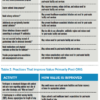Track List Available for Hospital Medicine 2017

Join SHM and thousands of colleagues from around the country for hospital medicine’s largest meeting, Hospital Medicine 2017 (HM17), May 1–4 at Mandalay Bay Resort & Casino in Las Vegas. The full education track has been announced, including new tracks such as High Value Care, Diagnostic Reasoning and Clinical Updates, Medical Education, and Health Policy. Returning popular tracks include Rapid Fire, Workshops, Pediatric, Quality, and more. Visit www.hospitalmedicine2017.org/schedule to view the complete track listings with breakout sessions.
Looking for more? Seize the opportunity to learn from an elite group of experts. Earn additional CME credits, broaden your skills, and fine-tune your practice. Immerse yourself in a day of learning by enrolling in one six pre-courses on May 1. Visit www.hospitalmedicine2017.org/precourse to view course topics, agendas, faculty, and more.




